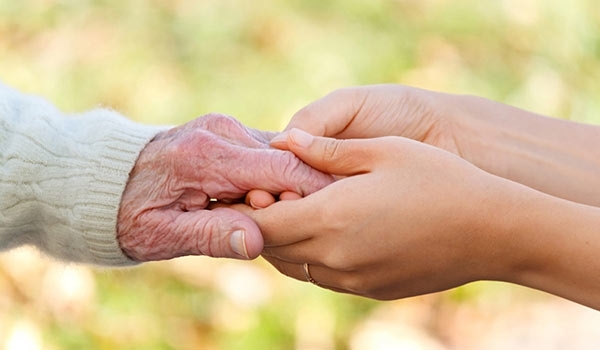6. Repaying Parents
10. Abu Hurayra reported that the Prophet, may Allah bless him and grant him peace, said, “A child cannot repay his father unless he finds him as a slave and the buys him and sets him free.” 11. Sa’id ibn Abi Burda said, “I heard my father sat that Ibn ‘Umar saw a Yamani man going around the House while carrying his mother on his back, saying, ‘I am your humble camel. If her mount is frightened, I am not frightened.’ Then he asked, ‘Ibn ‘Umar? Do you think that I have repaid her?’ He replied, ‘No, not even for a single groan.’ “Ibn ‘Umar did tawaf and came to the Maqam and prayed two rak’ats. He said, ‘Ibn Abi Musa, every two rak’ats make up for everything that has happened between them.'” 12. Marwan used to make Abu Hurayra his agent and he used to be located in Dhu’l-Hulayfa. His mother was in one house and he was in another. When he wanted to go out, he would stop at her door and say, “Peace be upon you, mother, and the mercy of Allah and His blessing.” She would reply, “And peace be upon you, my son, and the mercy of Allah and His blessing.” Then he said, “May Allah have mercy on you as you raised me when I was a child.” She answered, “May Allah have mercy on you as you were dutiful to me when I was old.” Whenever he wanted to go inside, he would do something similar. 13. ‘Abdullah ibn ‘Amr said, “A man came to the Prophet, may Allah bless him and grant him peace, and made a pledge to him that he would do hijra. He left his parents who were in tears. The Prophet said, ‘Go back to them and make them laugh as you made them weep.'” 14. Abu Hazim reported that Abu Murra, the mawla of Umm Hani’ bint Abi Talib had told him that he rode with Abu Hurayra to his land in al-‘Aqiq. When he entered his land, he shouted out in his loudest voice, “Peace be upon you, mother, and the mercy of Allah and His blessing!” She replied, “And peace be upon you and the mercy of Allah and His blessing.” He said, “May Allah have mercy on you as you raised me when I was a child.” She replied, “My son, may Allah repay you well and be pleased with you as you were dutiful towards me when I was old.”
7. Disobedience to Parents
15. Abu Bakra reported that the Messenger of Allah, may Allah bless him and grant him peace, said, “Shall I tell you which is the worst of the major wrong actions?” “Yes, Messenger of Allah,” they replied. He said, “Associating something else with Allah and disobeying parents.” he had been reclining, but then he said up and said, “And false witness.” Abu Bakr said, “He continued to repeat it until I said, ‘Is he never going to stop?'” 16. Warrad, the scribe of al-Mughira ibn Shu’ba, said, “Mu’awiya wrote to al-Mughira, saying, ‘Write down for me what you heard the Messenger of Allah, may Allah bless him and grant him peace, say.'” Warrad said, “He dictated to me and I wrote out, ‘I heard him forbid asking too many questions, wasting money and chit-chat.'”
8. “Allah curses whoever curses his parents”17. Abu’t-Tufayl said, “‘Ali was asked, ‘Did the Prophet, may Allah bless him and grant him peace, give you something special which he did not give to anyone else?’ He replied, ‘The Messenger of Allah, may Allah bless him and grant him peace, did not give me anything special which he did not give to everyone else except for what I have in my sword scabbard.’ He brought out a piece of paper. Written on that paper was: ‘Allah curses anyone who sacrifices an animal to something other than Allah. Allah curses anyone who steals a milestone. Allah curses anyone who curses his parents. Allah curses anyone who gives shelter to an innovator.'”
9. Being Dutiful to Parents as long as that does not entail disobedience to Allah
18. Abu’d-Darda’ said, “The Messenger of Allah, may Allah bless him and grant him peace, recommended nine things to me: ‘Do not associate anything with Allah, even if you are cut to pieces or burned. Do not abandon a prescribed prayer deliberately. Anyone who abandons it will forfeit Allah’s protection. Do not drink wine – it is the key to every evil. Obey your parents. If they command you to abandon your worldly possessions, then leave them for them. Do not contend with those in power, even if you think that you are in the right. Do not run away from the army when it is advances, even if you are killed while your companions run away. Spend on your wife out of your means. Do not raise a stick against your wife. Cause your family to fear Allah, the Almighty and Exalted.'” 19. ‘Abdullah ibn ‘Amr said, “A man came to the Prophet, may Allah bless him and grant him peace, and said, ‘I have come to make you a pledge that will do hijra although I have left my parents in tears.” The Prophet said, ‘Go back to them and make them laugh as you made them cry.'” 20. ‘Abdullah ibn ‘Amr said, “A man came to the Prophet, may Allah bless him and grant him peace, wanting to do jihad. The Prophet asked, ‘Are your parents alive?’ ‘Yes,’ he replied. he said, ‘Then exert yourself on their behalf.'”



